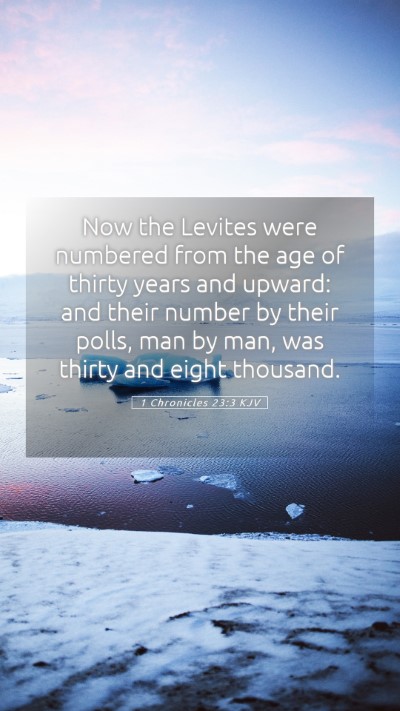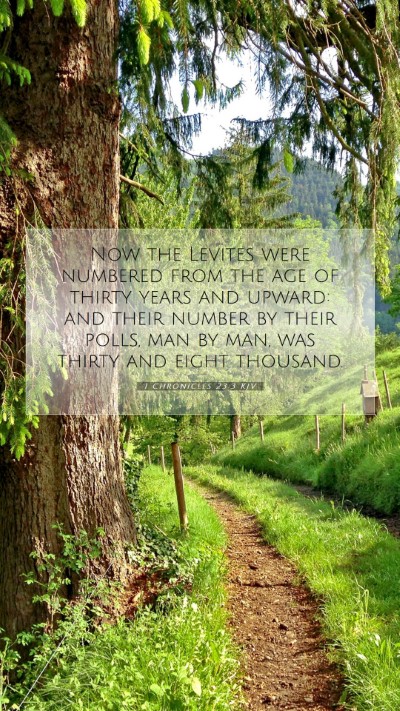Understanding 1 Chronicles 23:3
1 Chronicles 23:3 states:
“And David gathered together all the princes of Israel, with the priests and the Levites.”
Overview of the Verse
This passage is significant as it marks a critical moment in the biblical narrative where King David organizes the priesthood and establishes roles for worship. It reflects David's heart for God and his desire to create a structured and organized worship system for the nation of Israel.
Insights from Commentaries
-
Matthew Henry's Commentary:
Henry emphasizes the importance of order in worship and highlights David’s dedication to God. He points out that David’s gathering of leaders indicates his acknowledgment of the Levites' vital role in religion and worship. The organization of the priesthood was an essential step towards a structured worship system that acknowledged God’s holiness.
-
Albert Barnes' Notes:
Barnes notes that the gathering of the princes, priests, and Levites signifies a communal effort in spiritual matters. It illustrates David’s leadership qualities and his understanding of the significance of collaboration in religious practices. The involvement of all Israelite leaders demonstrates the unity required in worship and governance.
-
Adam Clarke’s Commentary:
Clarke highlights the logistical aspect of this gathering, pointing out that it was not only a religious act but also a political one. David was setting the framework for the temple service, which included detailed guidelines for presenting offerings and conducting sacrifices, thus ensuring that worship would be performed correctly and respectfully.
Significance of the Verse
This scripture speaks to the foundational principles of biblical worship, such as:
- Organization: The verse reflects the need for structure in religious practice to facilitate sincere worship and community involvement.
- Leadership: David’s initiative to involve significant leaders illustrates the importance of guidance and support in fulfilling God’s plans.
- Community Worship: By gathering all key figures, the verse reinforces the concept that worship is not merely an individual practice but a communal activity that requires participation from all members.
Bible Verse Commentary
1 Chronicles 23:3 is often referred to in discussions about:
- Organizational leadership within religious contexts.
- The establishment of sacred roles within the community of believers.
- The historical significance of the temple in ancient Israel.
Bible Study Insights
This verse can serve as a focal point for various Bible study groups and discussions, especially when exploring themes of leadership, community roles in the church, and the historical context of Old Testament worship.
Contextual Analysis
The historical context of 1 Chronicles 23:3 is essential for biblical exegesis:
David's reign entailed consolidating the nation of Israel, including its religious practices.
The Levites played a pivotal role in maintaining the spiritual and liturgical life of the people.
David's preparations for the temple reflected his understanding of sacredness in worship and community.
Application for Daily Life
When applying this verse to modern life, it serves as a reminder of the necessity of:
- Gathering Together: The importance of communal worship and fellowship in a believer’s life.
- Structured Worship: Recognizing and valuing the roles of individuals within a community in serving God.
- Leadership in Faith: Encouraging leaders within the church to organize and lead effectively in guiding their congregations toward spiritual goals.
Related Cross References
- 2 Samuel 6:15: David’s dramatic entrance into Jerusalem with the Ark of the Covenant.
- 1 Chronicles 15:2: The organization of the Levites for the transport of the Ark.
- 1 Chronicles 28:9-10: David instructing Solomon on temple building and worship.
Conclusion
In understanding 1 Chronicles 23:3, we gain insight into the significance of proper worship organization, the role of leadership, and the importance of community in spiritual practices. This verse encourages a deeper exploration of Bible verse meanings and opens doors for further Bible study insights into how we can shape our worship and community involvement today.


